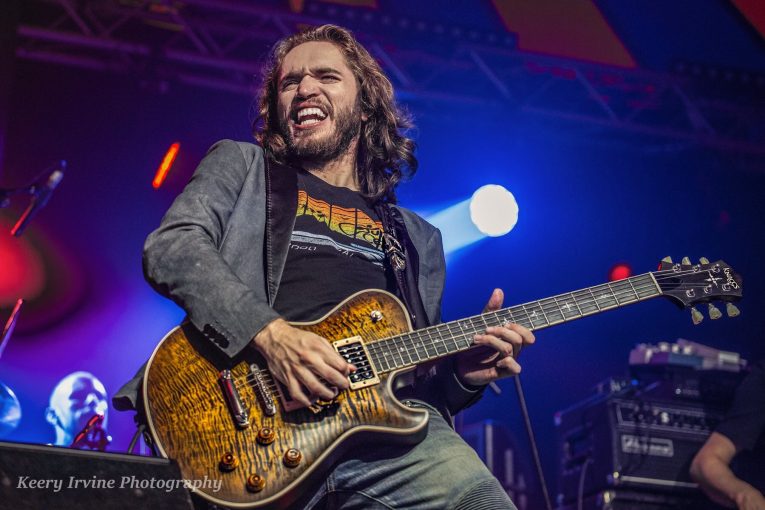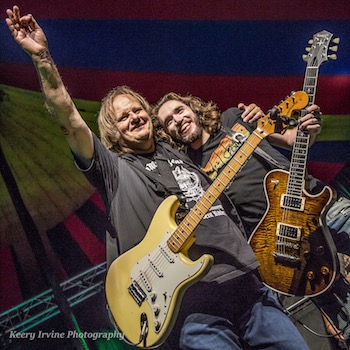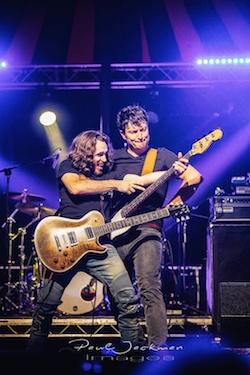
By Martine Ehrenclou
Powerhouse blues-rock guitarist, singer, songwriter, and producer, Eric Steckel found success at the age of 12 with his debut CD, A Few Degrees Warmer in 2002. A year later he performed at the 2003 Sarasota Blues Festival where blues-rock legend, John Mayall introduced him as the youngest guitarist ever to be on stage with the Bluesbreakers. In 2004, Mayall invited Eric on his Scandinavian tour and a year later he joined Mayall for session work on the Road Dogs album. In the following years, he maintained a ferocious tour schedule in Holland, Germany, Belgium and Italy. He opened for Johnny Winter at The Paradiso in Amsterdam, and shared the bill with Gregg Allman at the Pistoia Blues Festival.
With over 20 years on stage and in the studio, Eric Steckel continues to blow the doors off blues-rock with his guitar chops. He has nine live and studio albums to his name, the latest being the blues-rock, Polyphonic Prayer, released in 2018.
It is no exaggeration to call Eric Steckel a phenomenal guitarist, but one with soul and a vintage rock feel. Eric Steckel describes his music as “Blues Metal.” For the rest of us, it’s blues infused rock, with outstanding musicianship and great songwriting. On his latest release, he played all of the instruments except drums, and produced the album himself.
A force of nature? Maybe. But Steckel has put in the work and the time to develop his musical chops, touring almost nonstop in over twenty five countries. He has recently teamed up with Knaggs Guitars to create an Eric Steckel signature guitar.
Eric was kind enough to talk with us before he embarks on his tour in the US and Europe.
ME: You were 12 years old when you played with John Mayall at the 2003 Sarasota Blues Festival. How did that come about?
ES: That’s correct! It was a whirlwind day, especially for a 12-year-old kid. A fan of mine referred me to the Sarasota Blues Fest the year before and I was booked to open the festival. This was one of my first national festival appearances, and certainly became a memorable one. My entire family drove down from Philadelphia for that show. As fate would have it, John arrived early in his tour bus to check into the hospitality tent and get his credentials. He heard what he thought was a grown man on stage playing and told his crew he was going to go have a listen. What he found was a 4 foot tall, 12 year-old kid up there playing the Blues and he flipped out. He then found my father backstage and arranged for me to sit in with him during his set that night. After trading licks live with Buddy Whittington (John’s long-time guitarist), John emailed me two weeks later and invited me to tour Europe with him.
ME: You went on tour with John Mayall and the Bluesbreakers the next year. You were 13. Tell me about that experience and what it was like to tour with them.
ES: This was my first time out of the country, and to do it at such a high level with a living legend was way beyond comprehension for a then 13-year-old kid. Not to say I didn’t recognize how awesome it was, but it’s taken me until adulthood to fully grasp how monumental that was in my life. Riding around in a Prevost tour bus and playing for 5 to 7 thousand people each night at 13 years old is pretty insane. To do that with John Mayall, is even more insane!
ME: Tell me about how John Mayall took you under his wing.
ES: After that tour, and having bonded with John, he invited my family to his home in Los Angeles and to record guitar parts on his 2005 Road Dogs album. At this point, he was fully my mentor and taught me a lot about the Blues and the music business in general. He also taught me to make each note count and not try so hard.
ME: You were a child prodigy with your first album released, when you were 11 years old. How did you evolve into a masterful guitar player at such a young age? Lessons? Musical family? Practicing 24/7?
ES: In the early years, I was definitely as obsessed with the instrument as I am now, but it wasn’t a ritualistic thing when it came to practice. I didn’t lock myself in my bedroom and practice for 18 hours a day like you might assume. I picked up the guitar when the inspiration struck and I listened to my parents’ albums and would cop licks off my favorite of their records like Texas Flood and Live at the Fillmore East, etc. In those days, it was just about having fun with it and learning as much as I could, soaking it up like a sponge.

ME: You have a great singing voice as well. Did you start singing at the same time as learning to play the guitar?
ES: Thank you! I really wouldn’t agree with you on that until maybe this last album, after I had my vocal and sinus surgery which radically transformed my singing and gave me a new lease on singing in general. My confidence in the vocal department went up by about 500% since 2017. I started out listening to front men and women who sang and played guitar, so in the early days there was no question I would figure out how to sing because I didn’t see it any other way. But in the last year or so, I’ve put way more attention into my singing because now I feel I have a vehicle in which to really make that happen and I’m finally proud of my vocal abilities, which I showcased heavily on Polyphonic Prayer.
ME: You call your music “blues metal.” Please describe your style of music and who your influences are.
ES: Yes! Bluesmetal is a term my manager and I jokingly came up with in response to an interview in a guitar publication last year, but the term stuck and we have used it ever since. It actually has become a mini movement and there’s even a hashtag on Instagram for it now that fans of mine use to upload videos of themselves playing in my style. It’s very cool! I grew up with southern rock, hard rock, and southern metal as well as traditional blues, so for me, I just combined everything I heard as a kid into one playing style: Bluesmetal.
ME: Tell me about your songwriting. How long have you been writing? Do you write all the time or in phases? What is your process?
ES: Songwriting up until recently, was always a means to an end. When management said it’s time for a new album and I need X amount of originals, I would often try really hard to come up with stuff I had never done before. There were always some gems in there, though. But recently, I’ve relaxed my approach to songwriting and instead I write constantly and throw out the junk. It’s a more effective process and it makes my albums better with no filler. I’m so proud that Polyphonic Prayer has all 5-star reviews almost everywhere you look, and I believe it’s because there is no filler on the album or throw-away tracks that people skip over. That is not easy to do, but I’m learning how to really zone in on good songs the older and more experienced I get in the business.
ME: On Polyphonic Prayer, you play all of the instruments except drums and you produced the album. Have you always played so many instruments? When you conceived that album, did you have it in mind that you would sing, play guitar, keys, bass, write songs, and produce the album?
ES: That is correct! I’ve been playing several instruments for years now. I started playing Hammond organ and piano around the time I cut my 2008 Feels Like Home album because I was simply unhappy with all of the keyboard players I hired for the album and I figured I better teach myself how to play this stuff real quick or the album would never get released. So, I ended up playing the keyboard parts on that album and it gave me the confidence I needed to then play the keys on every album since, over the last 10 years. The idea to only hire a drummer for this album and do everything else, came about because it simply made the most sense. Why teach someone the parts when I can just play them? That was the mentality and it made for the best album I’ve released yet. It also made workflow easier and there was absolutely no drama or fighting during the recording process because it was basically just me and the engineer the whole time. I will continue this method for many, many years. As far as production, I always know what I want to hear in my head, and luckily since I grew up around studios and gear, I know how to dial things in to get that sound on tape.
ME: Tell me about your guitars. Do you only play Knaggs Guitars?

ES: Yes, I’m exclusive with Knaggs now but that is a recent development in my history as a guitarist for 20 years now. I started off trying to emulate my heroes. As a teenager I saved up for a real-deal vintage 1965 Strat and toured with that and a Super Reverb amp for years to sound like my idol Stevie Ray Vaughan. But there was a problem. The sound in my head was way different and I couldn’t make it happen. I knew what I was hearing but not sure what to buy to make that happen. And everyone around me told me “Son, you’re a bluesman. This is the gear you should be playing.”
Out of respect and ignorance, I followed suit. When I turned 18 and had more independence and freedom, I started trying gear that was typically not used by Blues guitarists and was finding I sounded better but I was scared to commit because I feared backlash from the Blues community. So I kept trying to wrangle “the” sound out of my vintage Fenders. At a certain point when I was about 20 or 21, I just threw caution to the wind and said it’s time to find myself and damn the torpedo’s if nobody likes it. So on my Dismantle The Sun album I played Tom Anderson, Ibanez, and PRS guitars into Bogner amps ( a huge departure ) and the sound was incredible and the album shot right up in the charts and became one of my most successful to date. “Empty Promises” is one of my most played songs of my career. At this moment I knew I could get away with playing the Blues this way, and when I met Joe Knaggs and Peter Wolf from Knaggs Guitars, it all fell even further into place.
ME: How did you find your first Knaggs guitar? What drew you to it?
ES: My first Knaggs guitar came about because a friend of mine stopped by my place in L.A. to hang out and sit out on the balcony and noodle on some guitars. He brought over a Kenai he had purchased years ago and I had heard about Knaggs so I picked it up and played a few notes and was blown away by the feel, even unplugged. So then I bought one for myself. At this time I did not know Joe or Peter or have any inside connections. Literally 7 days after purchasing my Knaggs, a fan of mine sent the video of me playing it to Peter (their PR manager) and he immediately reached out to work on a signature model and welcome me to the Knaggs tribe.
ME: Knaggs Guitars made a special signature Eric Steckel guitar. Please tell me about it.
ES: Yes, I’m over the moon and so proud of having my name on a Knaggs guitar and especially one that I genuinely love to play and has improved my tone and vibrato just from playing it. It’s that good. It’s easy to promote something you genuinely love and that’s the case with the Eric Steckel signature model Knaggs Kenai. It’s incredible seeing folks buying these all over the planet and posting photos and videos with them.
ME: You’re headed to Europe for another tour after a few dates in GA and FL. Do you tour more in Europe, other parts of the world or in the U.S.? If there is one area more than the others?
ES: That’s correct. Yes, I tour Europe and Australia heavily because guitar-based music is very popular there and is a bigger part of their whole music market than here in the US. Of course I’m an American and love playing in my own country, but if I can spend 3-4 months overseas playing every night like I do now, who am I to turn that down? That’s how I see it. We also play much larger venues and often sell out a majority of the gigs before even arriving in Europe, which is such a thrill for me, my management, and the rhythm section backing me up. What a feeling of hospitality from the people over there.
ME: What’s next for you besides your tour? Are you writing for a new album?
ES: After my Fall European tour, I will spend the holidays with family and friends and split my time between my place in L.A. and my family’s home in North Carolina. Plans for my Australia tour early 2019 are in the works and I will start writing for a 2020 new solo album as well. Very excited about all of this!
ME: Thanks so much for talking with me today.
ES: Thank you!
For more information on Eric Steckel:
Website: https://ericsteckel.com/home
Facebook: https://www.facebook.com/eric.m.steckel
Instagram: https://www.instagram.com/ericsteckelofficial/

Eric is one of the most humble young men you will ever meet. He could be an arrogant self involved butthead. He is far from that. He is amazing to watch practice and play live. Suring pra rice he will move and make facial expressions just like he is playing for a large crowd. His enthusiasm is unmatched with anybody I have ever met. Someday he will be a household name and one of the most revered players of his generation, I think he already is. Great article!
Bruce,
Thanks. He is indeed a fantastic player and performer. And tons of enthusiasm.
Always the best my kinder sister! Thank you!
Welcome Billie. Thanks for commenting.
Great interview, Martine! You turned me onto this exquisitely talented young man earlier this year via your column. Thank you for that! I’ve seen him live recently, chatted with him after the show, and will be a fan for life. I listen to his music regularly, and your interview brings him right into my living room alongside the music. It reminds me that despite his phenomenal success, he’s still a regular guy with his feet firmly on the ground. Nice work.
Paul,
Thank you for your kind comments. I’m so glad I was able to turn you onto Eric Steckel. How fun that you saw him live and met him after the show. Yes he does have his feet firmly on the ground. Nice guy as you discovered. Thanks again.